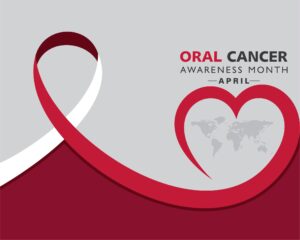
Did you know that April is Oral Cancer Awareness Month? It’s estimated that every hour (24 hours a day and 365 days a year) someone dies from this medical condition. It’s been estimated that about 43% of the 54,000 patients diagnosed in a year won’t survive longer than 5 years. It’s natural to feel intimidated by those statistics, but thankfully, oral cancer can often be treated effectively if it’s diagnosed early enough. Keep reading to learn more about this condition and how your dentist can help you prevent it!
What is Oral Cancer?
Although we tend to think of oral cancer as a singular issue, there are two distinct types. They are:
- Cancers of the oral cavity that impact your lips, teeth, gums, inside your cheeks, the floor of your mouth, and the front two-thirds of your tongue. This kind is predominantly caused by excessive use of tobacco and/or alcohol.
- Cancers of the oropharynx that occur in your throat, tonsils, base of your tongue, and pharynx (where your throat starts at the roof of your mouth). It’s often the result of an HPV (human papillomavirus) infection.
What Are the Symptoms of Oral Cancer?
Some warning signs that could point to this medical condition include:
- A sore or irritation that won’t go away.
- Red or white patches on your gums, tongue, or the lining of your mouth.
- Pain, tenderness, or numbness in your mouth or lips.
- A lump or area that’s crusted or thicker.
- Difficulty chewing, swallowing, speaking, or moving your tongue or jaw.
- The feeling that something is caught in your throat.
- Feeling hoarse or changes in your voice.
How Can My Dentist Prevent Oral Cancer?
Experts recommend that you schedule a regular checkup and cleaning with your dentist every 6 months. This allows them to monitor your dental condition and spot any areas of concern before they can progress. Not only do they perform a visual examination of your teeth and gums, but they also include a cancer screening at each checkup as part of standard preventative care. They have the unique training and experience necessary to identify early indicators of oral cancer and will work with you to develop an appropriate treatment plan right away.
How is Oral Cancer Treated?
If your dentist sees any potential problems, they’ll likely order additional tests and schedule a follow-up exam in a week or two. If cancer is confirmed, it’s usually treated with surgery or radiation therapy. If it’s caught in the later stages, it may require both radiation therapy and chemotherapy simultaneously. Another possible treatment consists of using drugs or other substances to pinpoint and attack the cancer cells.
If you haven’t seen your dentist in a while, why not schedule your next checkup during Oral Cancer Awareness Month? By visiting your dentist this April, you’ll gain peace of mind knowing that your mouth is being well cared for!
About the Author
Dr. JD Hansen is committed to providing a wide array of top-quality services to enhance his patients’ oral health, including preventative care and cancer screenings. He attended Brigham Young University for his undergraduate education and then earned his dental degree from the University of Louisville in 2012. Now, he utilizes state-of-the-art technology to make fast, accurate diagnoses and provide individualized treatment plans. If you’d like to schedule your next routine checkup, you can request an appointment on the website or by calling (801) 293-1234.
